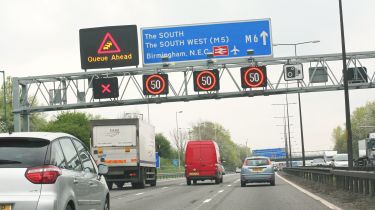Smart motorways to double in number and be renamed ‘digital roads’
Digital roads will have more emergency lay-bys and higher speed limits through roadworks than previous smart motorways

Smart motorways will double in number over the next six years and be renamed ‘digital roads’, it has been revealed.
There are currently 416 miles of smart motorway, but Jim O’Sullivan, chief executive of Highways England, has told the Times that, by 2025, there will be a total 788 miles in operation.
• A fifth of drivers ignore smart motorway red X signs
Around 100 miles of the existing smart motorway network is of the all-lane running variety, where there is no hard shoulder. The rest is made up of dynamic hard shoulder – where the hard shoulder becomes a running lane at peak times – and controlled motorway – where the hard shoulder is always retained.
In addition, the name ‘smart motorway’ is being ditched in favour of ‘digital roads’. With the new name comes a number of changes: emergency lay-bys will be placed closer together on sections of road with no hard shoulder and the speed limit through roadworks will be increased from 50mph to 60mph.
O’Sullivan claimed the new system would improve safety because broken-down vehicles would be able to pull off the road as opposed to having to stop in live lanes.
No more smart motorways, say MPs
MPs are calling for the rollout of smart motorways to be paused following concerns over the safety of converting the hard shoulder into a fourth lane.
The Campaign for Safer Roadside Rescue and Recovery (CSRRR) argues that having no hard shoulder reduces safety on the motorway for drivers – especially those who suffer a breakdown – and recovery workers.
At present, there are around 100 miles of all-lane running (ALR) smart motorways in England, while Highways England is planning to set up a further 225 miles by 2025 with a view to saving the taxpayer some £6billion.
Despite conceding that ALR smart motorways “offer clear reliability and efficiency and improvements”, the CSRRR says “these improvements have come at the cost of reduced safety of those who work on the hard shoulder, particularly recovery operators who don’t have access to the use of red warning beacons”.
ALR smart motorways use the hard shoulder as a fourth lane, while putting variable speed limits in place to control traffic flow.
• What is a smart motorway? Speed cameras, traffic management and hard shoulder use explained
Government data shows initial ALR schemes on the M25 saw a non-compliance rate of eight per cent for red X signals, meaning offending traffic could run into the back of broken-down vehicles in the lane.
Despite there being 16 reported crashes of this nature across all lanes last year, the cross-party parliamentary group says the Government has “failed” to continue to publish data on this metric.
One case study cited by the CSRRR is that of Steve Godbold, a recovery worker from Kent who was killed in September 2017 after being struck by an HGV that strayed on to the hard shoulder of the M25 while he was recovering a broken-down vehicle.
• UK roads are the safest in Europe
Tracey Crouch, Conservative MP for Chatham and Aylesford, supports the campaign. She told BBC 5 live: "We need the government to pause and reflect on whether we're getting this right."
Crouch argued the implementation of ALR smart motorways should be paused "until we have a better understanding about how we can protect those who have broken down and the recovery workers that come to assist them".
A Highways England spokesperson said: "Smart motorways are good for drivers; they add extra lanes giving extra space so more people can travel, they use technology which makes journeys more reliable and evidence proves they are as safe as traditional motorways, which are already among the safest roads in the world. Feedback from road users shows the majority feel confident driving on a smart motorway, and that they are safer and improve journey times."
The spokesperson added the organisation is planning on "making emergency areas more visible (M1, M3 and M5); introducing systems that detect stationary vehicles; and raising awareness of the need to comply with lane closures" while also "reducing the maximum space between emergency areas to one mile, where practical".
Do you think smart motorways are a good idea? Let us know your thoughts in the comments section below...
Find a car with the experts



